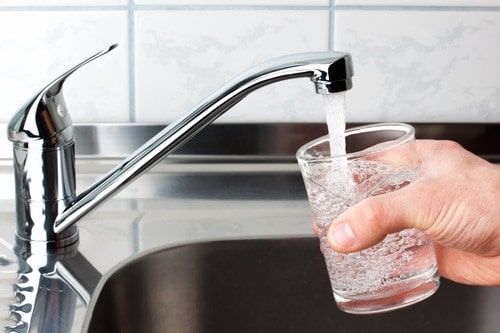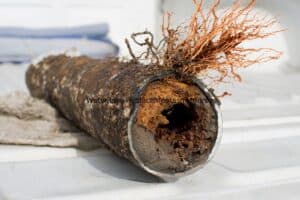Water line replacements in Monroe shouldn’t have you pulling your hair out. Replacing a Monroe water line is a normal part of the job for plumbing professionals. However, it’s definitely not at the top of the priority list for homeowners. It’s not even something on most people’s radar, as clean, running water is easy to take for granted. The kicker is when there’s an issue; that’s when you sit up, take notice, and possibly panic.
The more you know about water lines, the less panicking you will do. Most water comes into your home through a single water line supplied by the city or municipality. If something is amiss with your water, the tendency is to blame the city. But what if it’s not the water supply but your water line that’s the culprit? If your water line is to blame, you must act immediately.
A broken or damaged line could affect not only your water pressure but your water quality. There’s no sense putting your family at risk. Before scheduling water line replacements in Monroe, let’s get down to the nitty-gritty of water lines and what you should know.

What Is a Water Line?
There’s more than one pipe for supplying water to your hoses, sinks, toilets, tubs, and showers. Water enters your home through the main water line from the public water supply to your house. There is a meter that measures how much water you use each month so the city or municipality can bill you accordingly. Once inside, the water goes through distribution pipes from the main to the faucets, spigots, or the water heater for hot water distribution. If there is an issue with your main water line, it will affect all of your water.
To learn more about how your water system works, check out this infographic from the EPA.
What Are Common Water Main Problems?
As a homeowner, you know that so many things can go wrong with everything from the roof to the foundation. This is true of your water line. Because water flows through it so much of the time, and because it’s underground and exposed to corrosive elements, some things can cause damage that requires line replacement. Some things that can go wrong with a water main are:
Root intrusion into water lines is a common and costly problem — especially for older homes or those with trees nearby. Here’s a breakdown of the most effective root intrusion prevention options you can include in your article (or use as a quick homeowner reference.
🌳 Water Line Tree Root Intrusion and Prevention Tips
 Root intrusion into water lines is a common and costly problem in Monroe, GA — especially for older homes or those with trees nearby. And every home has trees nearby, so this is a widespread problem. The City of Monroe’s 2008 tree inventory identified 2,088 trees across city-owned properties, with water oak, willow oak, crape myrtle, and flowering dogwood making up 92% of the urban canopy. Notably, 42 trees were found within 2 feet of water meters, posing a potential threat to underground infrastructure. Water oak and willow oak, native species that thrive in moist soils, have particularly invasive roots. Access the full report here: City of Monroe Tree Inventory Summary Report (2008)
Root intrusion into water lines is a common and costly problem in Monroe, GA — especially for older homes or those with trees nearby. And every home has trees nearby, so this is a widespread problem. The City of Monroe’s 2008 tree inventory identified 2,088 trees across city-owned properties, with water oak, willow oak, crape myrtle, and flowering dogwood making up 92% of the urban canopy. Notably, 42 trees were found within 2 feet of water meters, posing a potential threat to underground infrastructure. Water oak and willow oak, native species that thrive in moist soils, have particularly invasive roots. Access the full report here: City of Monroe Tree Inventory Summary Report (2008)
To minimize future damage, city planners and residents should avoid planting water-loving species near water lines and instead opt for root-friendly alternatives, root barriers, and proper spacing of 10–15 feet. Here’s a breakdown of the most effective root intrusion prevention options.
1. Root Barriers
-
Description: These are physical barriers of plastic, metal, or fabric installed underground to deter tree roots close to water lines.
-
How It Works: Once in place, the barriers block the direct path to the water line, forcing roots to grow downward or away from the sensitive area.
-
Best Used When: Root barriers are a prophylactic approach when planting new trees or landscaping near water pipes.
2. Pipe Materials and Joint Design
- Modern Underground Piping (PVC, HDPE, or PEX): The most modern pipe materials do not require numerous joints like yesteryear’s cast iron and clay pipes. HDPE pipes have Fusion-Welded Joints, resulting in a seamless line without weak spots for roots to penetrate. With fewer weak points to exploit, these new synthetic pipes effectively prevent root intrusion. And they resist corrosion, lasting 50 to 100 years, much longer than the old led, clay, and cast iron pipes.
3. Chemical Root Inhibitors Protect Water lines From Tree Roots
-
Copper Sulfate or Foaming Root Killers: Root killers can be flushed into the line at risk to deter root growth in its vicinity. This offers a temporary protective barrier and is not a DIY remedy. Please consult with a professional to discuss application options. A mistake can damage trees and other vegetation and even harm the environment. best used after professional consultation to avoid damaging trees or the environment.
4. Proper Tree Placement
-
Plant Strategically: Strategic planting is one of the best ways to protect water and sewer lines from tree root invaders. Keep water-seeking species (e.g., willow, poplar, silver maple) far away from your underground pipes.
-
Root Growth Buffer Zone: Maintaining a no-tree zone 10–20 feet or more around water lines is best.
5. Regular Video Pipe Inspections
- Proactive Maintenance: Periodic plumbing camera video inspections are the perfect way to detect early signs of intrusion before major damage occurs. Catching potential problems before irreparable damage occurs is a sure way to save money on water line replacements around Monroe. In the early stages, water line repair is viable, but there is a point of no return when the only option is to replace the line.
FAQ About Water Line Replacements in Monroe
Q: Why Do Underground Pipes Crack and Break?
A: Cracked pipes are a common reason for water line damage. This can occur as the result of a freeze, depending on the depth of your line. It can also happen if the ground shifts due to seismic activity, construction, tree root growth, or just the natural settling of the soil.
Broken pipes are often due to tree roots that grow outward to seek out the closest water supply. If that happens to be your water line, the roots can work their way into the pipes causing damage and leaks that can affect your entire water supply.
Q: How Old Is Your Water Line?
A: Age can also impact the water line. If your house is over 50 years old and the water lines are along with it, your pipes are likely due for replacement, including your main water line. Pipes break down over time due to the pressure they withstand and the corrosive hard water minerals in the water.
Q: Should I replace my main water line?
A: You should consider replacing your home’s water system if it is over 50 years old or experiencing issues such as low water pressure, discolored water, frequent leaks, or visible water pooling in the yard. These signs often point to corrosion, root intrusion, or pipe failure. Schedule an appointment with a plumber for an evaluation and quote.
Q: What materials signal that replacement might be needed?
A: If your water line is made of galvanized steel, clay, lead, or polybutylene, it’s likely past its prime and should be replaced with more durable materials like PEX, copper, or HDPE.
Q: Can the line be repaired instead of replaced?
A: Yes, if the damage is isolated and the rest of the line is in good condition. However, if you’re making repeated repairs, full replacement is often more cost-effective in the long term.
Q: Is trenchless water line replacement an option?
A: In many cases, yes! Trenchless methods, such as pipe bursting or pipe lining, minimize digging and preserve landscaping. Your plumber can assess whether your property qualifies.
Q: How much does water line replacement typically cost?
A: Costs vary based on depth, length, materials, and method (trenching vs. trenchless) in Monroe, Georgia.
What You Need to Know about Monroe Water Line Replacement
 A plumber can fix some water supply issues with interior pipe repair or fixture repair or replacement, but often, if you have an issue with the supply line to your home, it will require repair or replacement of your water line. Since the water line is underground, replacement necessitates more than a quick swap out of parts.
A plumber can fix some water supply issues with interior pipe repair or fixture repair or replacement, but often, if you have an issue with the supply line to your home, it will require repair or replacement of your water line. Since the water line is underground, replacement necessitates more than a quick swap out of parts.
Before The Job Begins
- The first step in the water line replacement process is determining if a replacement will solve the issue.
- Once established that replacement is the best option, a professional plumber needs to survey your property, the main water line location, and any obstructions like trees, patios, driveways, gardens, and landscaping around or near the path of the water line.
- The plumbing contractor will evaluate the water line to determine if a full or partial replacement is necessary.
- Next, you will receive an estimate and recommendation for the location of the replacement pipe installation.
When the Job Starts
- Before digging begins, always Call 811, the national “call before you dig” number. This free service sends out utility personnel to mark the location of underground gas, electric, and water lines to avoid explosive accidents and legal issues. The utility company will also mark where the existing water line is and the new location if you are installing the new pipes in a new location.
Learn more at Call811.com. - With the help of your Monroe plumbing professional, you’ll need to choose the pipe material they will use. Get the best your budget will allow. This will ensure longevity as well as have a positive impact on the future value of your home should you decide to sell.
Your Trenching Option
For traditional trenching plumbing options, excavation is the next step. The plumber will remove the soil to uncover the existing water line. This method typically requires excavating a trench the length of the line. The new pipe replaces the old one down in the trench, the seams are sealed, and lines are attached to the home plumbing supply pipes.
Once the plumbing company excavates the old line, they will need to turn off the water heater and store extra water in the bathtub and gallon containers, as the plumbers will turn off the water to your home, which will remain off for the work. Once the plumbers test the water line to ensure no breaks or leaks, they bury the new pipes. Then, it is time for you to oversee the reconstruction and repair of your landscaping and yard.
Minimally Intrusive Trenchless Line Replacement
If having the expense and hassle of restoring your property after a trenching line replacement, there is another option. Unlike traditional trenching, trenchless water line replacement allows plumbers to replace underground pipes without digging a continuous trench. Instead, methods like pipe bursting (breaking the old pipe while pulling in a new one) or pipe lining (inserting a resin-coated liner into the existing pipe) are used. These techniques are less invasive, preserve landscaping, and often result in faster project completion. While not suitable for every situation, trenchless options are ideal when limited access or minimizing disruption is a priority. Ask your plumber if your property qualifies — it could save time, money, and your lawn.
How to Choose the Right Plumber for the Job
Water line replacement is a much bigger job than toilet repair, faucet replacement, or even water heater installation. Choosing the right plumbing professional near Monroe is critical to ensuring they do the job right. Here are some things to look for:
- You must hire a licensed plumber, which means they have passed a test of their knowledge before they can practice plumbing as a licensed plumber.
- Only hire an insured plumber. Make them provide proof of that insurance. You’ll be legally responsible if a worker is injured on your property and isn’t insured. Always ask for proof of insurance. It’s your protection against liability.

- Ensure they’re experienced and ask how many water line replacements they’ve completed. Please find out how long they’ve been in business and who will be doing the work. Will it be the owner, a Master Plumber, an experienced plumber, or a new hire who has never done a water line replacement? You deserve to know who will be working on your project.
- Get a detailed estimate. You need to know if they charge by the hour or a flat fee for the anticipated work. Read reviews to see if customers complain about paying by the hour for the slowest plumbers on Earth. You do not want to deal with that.
- Ask if they guarantee their work. Does the guarantee include the pipes? Does it include the installation? Get the details before you hire a contractor.
Anthony Wimpey Plumbing is Your Plumber Near Me, Monroe
Water is a necessity. Call a plumber immediately if there is an issue with your water line. If you’ve never had major plumbing work done, it can make you feel a little out of your element when facing a water line issue. The good news is that we are in your corner. At Anthony Wimpey, our team of professionals has extensive experience with residential plumbing needs, including low water pressure and water line replacement. We’re your go-to emergency plumbing company if you feel like you might have an issue. We’ll respond promptly to assess and address your water main and will work to resolve it as quickly as possible. Contact us today. Call 770-284-4787 to schedule an appointment or service call. We want to replace your water line in Monroe.


